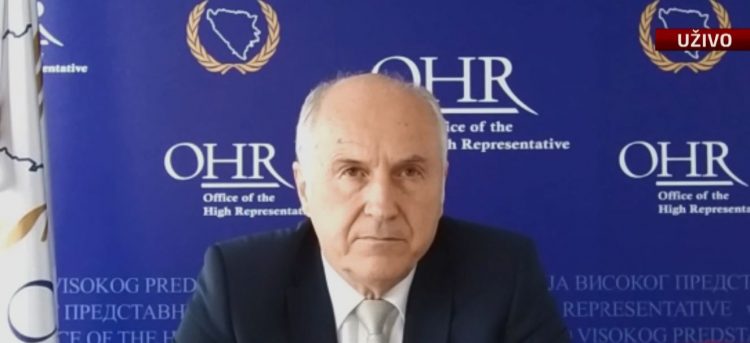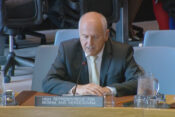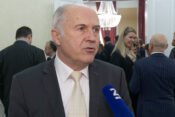
Bosnia’s international administrator, Valentin Inzko, told N1 on Wednesday that the reason why he did not use the ‘Bonn Powers’ - a special set of powers which enable him to, among other things, impose laws and fire officials - is that he did not have support from the international community to do so in the past decade.
High Representative Valentin Inzko is tasked with overseeing the civilian implementation of the 1995 Dayton Peace Agreement which ended the Bosnian war and contains the country’s Constitution. He reports to the UN Security Council on the implementation of the Agreement every six months.
In his latest report, which he presented on Tuesday, Inzko warned about the rhetoric of a “peaceful dissolution” of Bosnia and Herzegovina which is coming from the country’s semi-autonomous Republika Srpska (RS) entity, primarily the leader of the ruling party in the RS and current BiH Presidency Chairman, Milorad Dodik.
Dodik has been arguing that the best option for the country would be for Bosnia’s two entities to separate peacefully.
Inzko said that “there were other issues” that could have been raised but that some of those are, unfortunately, ongoing problems that are often repeated in his reports.
“The main topic was the ‘peaceful separation’ and the claim that in BiH we cannot live together, which is untrue. In Bosnia, people always lived together, there were always four religions and Bosnia was known for that,” he said, arguing that life in the country was according to European standards “even when there was no Europe.”
“If they cannot live together in BiH, then Europe is also impossible and we do not accept that. That would be a defeat for humanity,” Inzko stressed.
He argued that foreign officials can not even fathom the idea of having their president say that his country is “impossible” and advocate its dissolution the way that Dodik does.
Inzko mentioned the possibility of Dodik facing sanctions but said that he does not expect this coming from the European Union soon.
He said that the glorification of war criminals is “unacceptable”, referring to the fact that the National Assembly of Bosnia’s Republika Srpska (RS) entity decorated some of its top former officials who were convicted of war crimes.
“We had such criminals in Austria as well and there are still people who think that Hitler was OK, but we have a law against that,” he argued.
One such case that was meanwhile resolved was a plaque dedicated to Radovan Karadzic on a dormitory which was unveiled by Dodik years ago, Inzko noted.
The plaque was removed, but Dodik did not want to do that personally and instead Karadzic’s daughter, Sonja Karadzic, asked for it to be removed, he said, arguing that Dodik “proved to be a coward” in that case.
In early February, Inzko sent a letter to the RS National Assembly leadership, asking the institution to annul the honours it awarded to convicted war criminals within three months.
The deadline has already expired, but the Austrian diplomat noted that the RS National Assembly will discuss the issue on May 9.
He also announced that a law banning genocide denial could be sent into the parliamentary procedure for the third time soon.
“It's not good that the international community is looking the other way, I'm not satisfied,” he said, but added that he will wait for RS lawmakers to discuss the issue before taking any further steps.
Inzko then revealed why he never used the Bonn Powers.
He explained that his task when he took over the post in 2009 was for Bosnia to implement the ‘5 + 2 Agenda’, put together by the Peace Implementation Council (PIC), the international body overseeing Bosnia’s peace process, to define what must be done in order for the Office of the High Representative (OHR) to close its doors in the country.
“Everyone thought it would be over in half a year and that the OHR would shut down,” he said.
He explained that international community officials told him then that “this is now a time of domestic responsibility” and that the Bonn powers should not be used.
“So, for these 10 years, I have not had the support to use the Bonn powers,” he stressed.
The argument was that using the Bonn Powers is not compatible with Bosnia’s aspirations toward EU candidate status, he said.








Kakvo je tvoje mišljenje o ovome?
Budi prvi koji će ostaviti komentar!